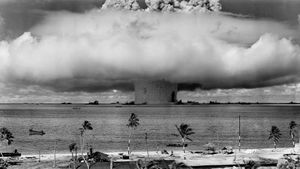Foreign ministers from some of the world's leading industrialized nations gathered recently amid intensifying tensions stemming from the Israel-Hamas conflict and the Russo-Ukrainian War. At their meeting near Rome, stakeholders from the G7 — made up of Canada, France, Germany, Italy, Japan, the United Kingdom, and the United States — discussed strategies aimed not only at facilitating ceasefires in regions like Gaza and Lebanon but also at maintaining international unity and support for Ukraine. This meeting marks one of the last significant diplomatic efforts from the Biden administration as it prepares to hand over power to the incoming Trump administration, which has expressed skepticism toward prolonged aid to Ukraine.
During the conference, Italian Foreign Minister Antonio Tajani highlighted the pressing need for coordinated responses. Tajani stated, "Dialogue with partners is key," emphasizing collaboration among nations to address the crises at hand. Meanwhile, Israel's ambassador to the U.S., Mike Herzog, expressed optimism about reaching a ceasefire agreement with Hezbollah within days. This potential breakthrough came as Arab nations, including those from Saudi Arabia, Egypt, Jordan, and the United Arab Emirates, joined the G7 discussions, advocating for immediate cessation of hostilities.
Ayman Safadi, Jordan's foreign minister, called for "a permanent ceasefire" to halt the devastation inflicted upon civilian lives in the region. Egyptian counterpart Badr Abdelatty confirmed plans for a ministerial conference to mobilize humanitarian aid for Gaza, reinforcing the sense of urgency surrounding these discussions. The so-called “Quintet” comprising the U.S. and Arab allies aims to create frameworks for post-conflict recovery efforts, seeking to mitigate the fallout from the recent escalations.
Beyond the Middle East issues, discussions also pivoted to the intensifying hostilities between Russia and Ukraine. After Russia's recent missile launch, described by President Vladimir Putin as retaliation for Ukraine's long-range attacks using Western-supplied weaponry, G7 nations stepped up their commitments to support Ukraine militarily and economically. British Foreign Secretary David Lammy emphasized the G7’s steadfastness, making it clear, "It’s hugely important... to stand with Ukraine for as long as it lasts."
Despite these commitments, the specter of reduced support looms as both Germany and the U.S. face domestic pressures. Germany has emerged as Ukraine's primary military supporter within Europe, providing substantial military aid — around $11.4 billion so far — but is projected to scale back this assistance to approximately $4.18 billion by 2025, driven by mounting economic challenges. The Kiel Institute warns this decrease could significantly affect overall support for Ukraine, especially if the U.S. scales back its contributions under Trump.
Domestically, Germany's government is experiencing turmoil just as the general elections are on the horizon, with political divides over Ukraine policy widening. The collapse of Chancellor Olaf Scholz’s ruling coalition has stricken significant fears within Europe, especially with the recent wave of political instability. Scholz’s handling of foreign relations has faced scrutiny too, particularly following contentious discussions with Russian President Vladimir Putin — described by critics as weakening the unity needed against Russia’s aggression.
Meanwhile, the U.S. decision to provide anti-personnel landmines to Ukraine has drawn condemnation from both international observers and human rights advocates. At the recent Anti-Personnel Mine Ban Treaty conference held in Cambodia, UN Secretary-General Antonio Guterres condemned the rise of landmine threats, stressing the exorbitant toll they take on civilian populations. He remarked on the importance of compliance with the treaty, urging all signatory nations to double down on efforts to eradicate such weapons.
This decision from the U.S. has been met with mixed reactions from Ukrainian authorities. President Volodymyr Zelensky characterizes the move as pivotal for staving off Russian forces, but human rights groups caution about the long-term ramifications this could impose on innocent civilians living within conflict zones.
Germany’s situation epitomizes the difficult balancing act facing many nations currently involved with the conflict. The country is simultaneously providing aid to Ukraine and grappling with its domestic economic outlook, which shows signs of significant strain, projected to experience the weakest growth among major European economies next year. The uncertainty of U.S. foreign policy under Trump's administration adds even more complexity to Germany's position. According to forecasts, Germany will be required to make hefty investments to maintain its industrial base and avoid the looming threat of deindustrialization amid broader geopolitical changes.
Volkswagen recently announced factory closures leading to massive job losses, raising significant alarm bells about the industrial health of the nation as it tries to remain competitive on the global stage. This economic downturn has rekindled fears of deindustrialization, long warned of by analysts who note the increasing competition from countries like China, which has been seizing market share from traditional European auto manufacturers at startling rates.
The highlight of the G7 meeting also coincided with International Day for the Elimination of Violence against Women, signaling Italy's commitment to addressing gender-based violence through domestic reforms. This dual focus on foreign policy and internal social issues is illustrative of the broader challenges faced by national leaders as they try to maintain focus on urgent societal needs alongside international obligations.
With upcoming elections around the corner and the winds of change blowing through the political landscapes across the Atlantic, it remains to be seen how each nation will navigate the complex interplay of international commitments and domestic pressures. Observers note the fragility of coalitions and public support, forecasting unpredictable outcomes as new administrations take charge.



